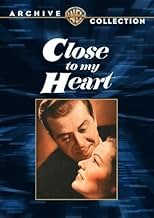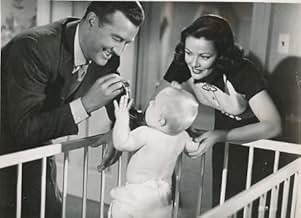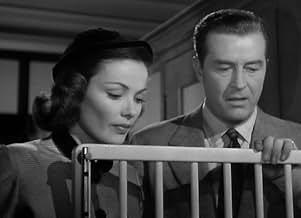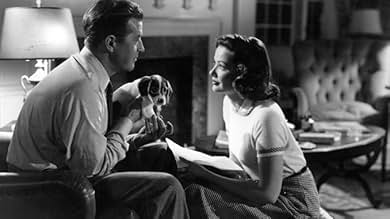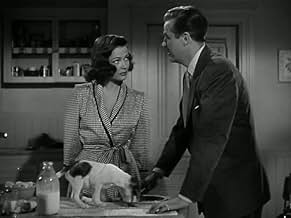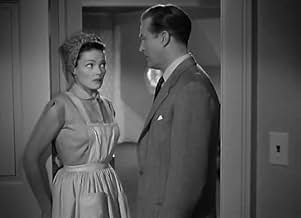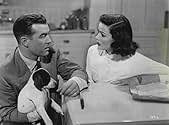AVALIAÇÃO DA IMDb
6,5/10
563
SUA AVALIAÇÃO
Adicionar um enredo no seu idiomaA columnist and his wife deal with obstacles when they try to adopt an abandoned baby.A columnist and his wife deal with obstacles when they try to adopt an abandoned baby.A columnist and his wife deal with obstacles when they try to adopt an abandoned baby.
- Direção
- Roteiristas
- Artistas
Baby John Winslow
- Baby Danny
- (as Baby John)
John Alvin
- Prospective Adoptive Father
- (não creditado)
Rodney Bell
- Young Parent in Car
- (não creditado)
Nan Boardman
- Woman Patient
- (não creditado)
Ralph Byrd
- Charlie
- (não creditado)
Luther Crockett
- Prison Warden
- (não creditado)
Douglas Hudson Finley
- Baby in other car
- (não creditado)
Elizabeth Flournoy
- Dr. Williams's Receptionist
- (não creditado)
Dick Gordon
- Clothing Store Owner
- (não creditado)
Fred Graham
- Prison Guard
- (não creditado)
Avaliações em destaque
Housewife Gene Tierney cannot have a baby, and does not want to wait two years until the adoption agency makes one available to her. Columnist Ray Milland, on the other hand, goes into passive-aggressive mode, when Tierney, acting on a tip from a friend, offers to adopt a baby simply dropped off at the local police station. Will Milland's zealous attempts at finding out the true parentage of the baby cause Faye Bainter's quietly authoritarian adoption agency to determine that Milland and Tierny are unfit to hold little baby Danny CLOSE TO MY HEART?
1951 was one of the peak years of the baby boom, and this movie is a fascinating window into an era in which a woman wanting "a baby for every room" was not thought to be unusual. Tierney, in her single-minded desire to get herself a nice newborn baby right now, without delay, feels more than a little neurotic, to this modern viewer's eyes. Bet she was viewed as just normal, back then. Milland, who seems to have no problem being childless, appears to be the more normal character, even when he gets a little obsessed about finding out where this baby he's adopting actually came from. I think the movie makers were trying to get us to think he was the weird one. Faye Bainter, who plays the caseworker from the adoption agency, does a dead on interpretation of a sweet-seeming, but ultimately rather cold bureaucrat.
The quality of the acting is exemplified towards the end, when Milland comes home to a quietly angry Tierney. The dynamic of a somewhat oblivious husband who suddenly realizes he may have totally destroyed his relationship, and an equally oblivious wife who has manipulated herself into thinking divorce for the first time in her life, is rarely this realistically portrayed.
This is worth seeing, mostly for the acting, and the unusual for the day subject matter. If you want noir or tough guys, though, look elsewhere. This is almost the 50s equivalent of a movie that would play on Lifetime.
1951 was one of the peak years of the baby boom, and this movie is a fascinating window into an era in which a woman wanting "a baby for every room" was not thought to be unusual. Tierney, in her single-minded desire to get herself a nice newborn baby right now, without delay, feels more than a little neurotic, to this modern viewer's eyes. Bet she was viewed as just normal, back then. Milland, who seems to have no problem being childless, appears to be the more normal character, even when he gets a little obsessed about finding out where this baby he's adopting actually came from. I think the movie makers were trying to get us to think he was the weird one. Faye Bainter, who plays the caseworker from the adoption agency, does a dead on interpretation of a sweet-seeming, but ultimately rather cold bureaucrat.
The quality of the acting is exemplified towards the end, when Milland comes home to a quietly angry Tierney. The dynamic of a somewhat oblivious husband who suddenly realizes he may have totally destroyed his relationship, and an equally oblivious wife who has manipulated herself into thinking divorce for the first time in her life, is rarely this realistically portrayed.
This is worth seeing, mostly for the acting, and the unusual for the day subject matter. If you want noir or tough guys, though, look elsewhere. This is almost the 50s equivalent of a movie that would play on Lifetime.
If anything, this film is a good example of what it means to take something into context. There was a serious stigma of adoption around, as well as long before, the decade/century this film was made. I admire it for its attempt to debunk it.
Milland's performance is adequate, although I agree with another reviewer who finds it difficult to like his character. What surprised me is Tierney's performance. I think her range as an actress was sadly discounted, especially after the success of Laura and Leave Her To Heaven. She proves in this movie, at least to me, she was capable of just about any role; and Night And The City is excellent proof.
If you're a fan of supporting actress Fay Bainter, this is a must-see.
Milland's performance is adequate, although I agree with another reviewer who finds it difficult to like his character. What surprised me is Tierney's performance. I think her range as an actress was sadly discounted, especially after the success of Laura and Leave Her To Heaven. She proves in this movie, at least to me, she was capable of just about any role; and Night And The City is excellent proof.
If you're a fan of supporting actress Fay Bainter, this is a must-see.
10gulfhorn
Please help me to purchase this movie, if it is available. Ray Milland and Gene Tierney were excellent and the plot was played very well. I checked once to purchase the movie but was told it wasn't available for some reason or another. It has been 30 years since I saw it, I have always wanted to see it again. I have told my wife and kids about ti as well, and they too want to see it. I hope someone will be able to let me in on whether or not and where I can buy the VHS or DVD copy. This movie was based on a reporter and his wife's challenge to adopt a baby. When someone mentions to the reporter, Ray Milland, that he needed to be careful as to not get a bad seed, he almost ruins the happy moment.
Thanks
Thanks
I remembered this movie from years ago, and somehow I had it stuck in my mind that James Stewart played the husband - it was the kind of role he was good at, especially the emotional closing scenes, but instead it is Ray Milland as journalist Brad Sheridan and Gene Tierney as Midge Sheridan. The opening scene shows a doctor telling Midge that she will never be able to have a child. She takes the news hard, but then she and her husband of four years begin looking for a baby.
They go to an adoption agency - actually Midge does - and is told there is a two year waiting list by the sympathetic head of the agency, Mrs. Morrow (Fay Bainter). But they get a tip about a foundling left at a police station, and Midge goes to visit him. She goes to visit every day at the orphanage, bathes him, cares for him, brings him dolls. Eventually the Sheridans get permission to take him home with them in hopes it will lead to adoption. They name the child "Danny" in the meantime.
Midge doesn't care who his parents are, but Brad is not so sure, especially when he finds out about an adopted boy who became a criminal in spite of being brought up in a good adoptive home. Mrs. Morrow is worried that if Brad finds out his parentage is "bad" that he will never treat Danny like a true blank slate. However, part worry over the possible mental heritage of Danny, part the natural curiosity of a blood-hound reporter has him chasing leads to find out how Danny came to be abandoned and who did the abandoning. What does he find out? Watch and find out.
This really is a sentimental journey, and you have to leave your modern sensibilities on hold to enjoy this little story from 66 years ago. How can a middling journalist afford a house that looks like a bank president's on one salary? Why does Midge go to the doctor to learn of her infertility AND to the adoption agency alone? Why does Midge dress to the nines to clean house and handle the baby? Doesn't Mrs. Morrow have anything better to do than to follow Brad's search for Danny's parents? You are just going to have to forget about these questions.
The acting here is quite good, and Ray Milland shows a side of his acting chops as a normal family man that he seldom got to do over at his home studio of Paramount. As usual, Max Steiner's score sets just the right mood. Do note that not everybody in the 50s agreed with what this film was trying to say about criminology here. For an alternate view watch 1956's "Bad Seed".
They go to an adoption agency - actually Midge does - and is told there is a two year waiting list by the sympathetic head of the agency, Mrs. Morrow (Fay Bainter). But they get a tip about a foundling left at a police station, and Midge goes to visit him. She goes to visit every day at the orphanage, bathes him, cares for him, brings him dolls. Eventually the Sheridans get permission to take him home with them in hopes it will lead to adoption. They name the child "Danny" in the meantime.
Midge doesn't care who his parents are, but Brad is not so sure, especially when he finds out about an adopted boy who became a criminal in spite of being brought up in a good adoptive home. Mrs. Morrow is worried that if Brad finds out his parentage is "bad" that he will never treat Danny like a true blank slate. However, part worry over the possible mental heritage of Danny, part the natural curiosity of a blood-hound reporter has him chasing leads to find out how Danny came to be abandoned and who did the abandoning. What does he find out? Watch and find out.
This really is a sentimental journey, and you have to leave your modern sensibilities on hold to enjoy this little story from 66 years ago. How can a middling journalist afford a house that looks like a bank president's on one salary? Why does Midge go to the doctor to learn of her infertility AND to the adoption agency alone? Why does Midge dress to the nines to clean house and handle the baby? Doesn't Mrs. Morrow have anything better to do than to follow Brad's search for Danny's parents? You are just going to have to forget about these questions.
The acting here is quite good, and Ray Milland shows a side of his acting chops as a normal family man that he seldom got to do over at his home studio of Paramount. As usual, Max Steiner's score sets just the right mood. Do note that not everybody in the 50s agreed with what this film was trying to say about criminology here. For an alternate view watch 1956's "Bad Seed".
Ray Milland and Gene Tierney star in a near remake of Penny Serenade. They can't have children and explore the avenue of adoption. In the Beulah Bondi role of the agency inspector, Fay Bainter takes over. If you've seen her in Journey for Margaret, you know she can come across as concerned for children very well. This one has a couple of differences, mostly to do with Gene's character versus Irene Dunne's original version. Irene is sweet and deep-feeling, but Gene seems incredibly insincere and impulsive.
Everything out of Ray's mouth is hilarious and witty, adding a refreshing comic element to the story. I happened to agree with his side of the argument about adoption, but unfortunately, Hollywood took Gene's side. She's made out to be a natural mother who can't resist the baby in question, but I didn't believe her for a second. As is the case with many couples who have a great relationship, once child-rearing enters into the mix, fights and incompatibilities float to the surface. Ray and Gene were happy at the start of the movie, but when she becomes obsessed with the idea of adopting this particular baby, it strains their marriage. This movie also tackles the nature vs. Nurture debate that has stumped experts through the ages. If you have a strong opinion one way or the other, you might not like the message of the film. And while it's not as good as the original version, if you like the cast, you might want to give it a shot.
Everything out of Ray's mouth is hilarious and witty, adding a refreshing comic element to the story. I happened to agree with his side of the argument about adoption, but unfortunately, Hollywood took Gene's side. She's made out to be a natural mother who can't resist the baby in question, but I didn't believe her for a second. As is the case with many couples who have a great relationship, once child-rearing enters into the mix, fights and incompatibilities float to the surface. Ray and Gene were happy at the start of the movie, but when she becomes obsessed with the idea of adopting this particular baby, it strains their marriage. This movie also tackles the nature vs. Nurture debate that has stumped experts through the ages. If you have a strong opinion one way or the other, you might not like the message of the film. And while it's not as good as the original version, if you like the cast, you might want to give it a shot.
Você sabia?
- CuriosidadesThe Sheridans' car is a 1951 Ford Custom Deluxe convertible coupe.
Principais escolhas
Faça login para avaliar e ver a lista de recomendações personalizadas
Detalhes
- Data de lançamento
- País de origem
- Idioma
- Também conhecido como
- Close to My Heart
- Locações de filme
- Empresa de produção
- Consulte mais créditos da empresa na IMDbPro
- Tempo de duração
- 1 h 30 min(90 min)
- Cor
- Proporção
- 1.37 : 1
Contribua para esta página
Sugerir uma alteração ou adicionar conteúdo ausente

